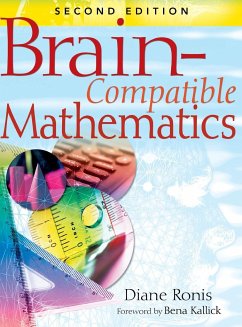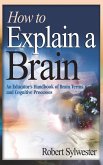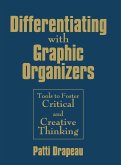Diane Ronis
Brain-Compatible Mathematics
Diane Ronis
Brain-Compatible Mathematics
- Gebundenes Buch
- Merkliste
- Auf die Merkliste
- Bewerten Bewerten
- Teilen
- Produkt teilen
- Produkterinnerung
- Produkterinnerung
Build upon a student's neural wiring for learning with this second edition of a powerful bestseller that bridges the world of brain research with improved mathematics instruction.
Andere Kunden interessierten sich auch für
![How to Explain a Brain How to Explain a Brain]() Robert SylwesterHow to Explain a Brain82,99 €
Robert SylwesterHow to Explain a Brain82,99 €![The Developing Brain The Developing Brain]() Marilee SprengerThe Developing Brain81,99 €
Marilee SprengerThe Developing Brain81,99 €![Being Mentored Being Mentored]() Hal PortnerBeing Mentored50,99 €
Hal PortnerBeing Mentored50,99 €![Rainbows of Intelligence Rainbows of Intelligence]() Sue TeeleRainbows of Intelligence82,99 €
Sue TeeleRainbows of Intelligence82,99 €![The Eleven Commandments of Good Teaching The Eleven Commandments of Good Teaching]() Vickie GillThe Eleven Commandments of Good Teaching68,99 €
Vickie GillThe Eleven Commandments of Good Teaching68,99 €![Differentiating With Graphic Organizers Differentiating With Graphic Organizers]() Patti DrapeauDifferentiating With Graphic Organizers90,99 €
Patti DrapeauDifferentiating With Graphic Organizers90,99 €![Making Inclusion Work Making Inclusion Work]() John BeattieMaking Inclusion Work87,99 €
John BeattieMaking Inclusion Work87,99 €-
-
-
Build upon a student's neural wiring for learning with this second edition of a powerful bestseller that bridges the world of brain research with improved mathematics instruction.
Hinweis: Dieser Artikel kann nur an eine deutsche Lieferadresse ausgeliefert werden.
Hinweis: Dieser Artikel kann nur an eine deutsche Lieferadresse ausgeliefert werden.
Produktdetails
- Produktdetails
- Verlag: Corwin
- 2. Auflage
- Seitenzahl: 98
- Erscheinungstermin: 26. September 2006
- Englisch
- Abmessung: 286mm x 221mm x 10mm
- Gewicht: 529g
- ISBN-13: 9781412939379
- ISBN-10: 1412939372
- Artikelnr.: 21527335
- Herstellerkennzeichnung
- Produktsicherheitsverantwortliche/r
- Europaallee 1
- 36244 Bad Hersfeld
- gpsr@libri.de
- Verlag: Corwin
- 2. Auflage
- Seitenzahl: 98
- Erscheinungstermin: 26. September 2006
- Englisch
- Abmessung: 286mm x 221mm x 10mm
- Gewicht: 529g
- ISBN-13: 9781412939379
- ISBN-10: 1412939372
- Artikelnr.: 21527335
- Herstellerkennzeichnung
- Produktsicherheitsverantwortliche/r
- Europaallee 1
- 36244 Bad Hersfeld
- gpsr@libri.de
Diane Ronis is a professor of education at Southern Connecticut State University and has a Ph.D. in curriculum and instruction. Her drive to make learning meaningful to all students comes from 17 years of teaching middle school and high school mathematics and fine arts as well as eight years of experience instructing preservice teachers at the college and graduate level. Ronis has been a presenter and keynote speaker at numerous conferences, workshops and seminars, and is the author of Brain Compatible Mathematics, Brain Compatible Assessments, Critical Thinking in Math, Problem Based Learning for Math & Science: Integrating Inquiry and the Internet, and Clustering Standards in Integrated Units.
Foreword
Preface
Publisher¿s Acknowledgements
Introduction
About the Author
1. Performance-Based Learning and Assessment
Traditional Versus Brain-Friendly Assessments
Importance of Performance Assessment
Alignment of Curriculum and Assessment
Assessment as Continuous Monitoring
Assessment as Tool for Learning
Grades K-2 Units
2. The Six Pillars of Performance Task Development
Set Up Clear Performance Goals
Employ "Authentic" Project Tasks
Teach and Emphasize Criteria Levels and Performance Standards
Provide Models and Demonstrations of Excellence
Teach Strategies Explicitly
Use Ongoing Assessments for Feedback and Adjustments
Brain-Compatible Framework
Grades 3-5 Units
3. Multiple Intelligences and Brain-Compatible Learning
Theory of Multiple Intelligences
Multiple Intelligences Model
Assessment for Multiple Intelligences
Grades 6-8 Units
4. Performance-Based Instructional Strategies
Cooperative Learning
Writing and Communicating in the Classroom
Classroom Practice
Challenge Project Unit
5. Problem-Solving Strategies
Instructional Strategies
Problem Exploration
Heuristics
Study Skills, Thinking Skills, and Thinking Processes
Mnemonic Techniques
Organizational Strategies
Patterning
Challenge Project Unit
6. Teaching and Assessing With the Rubric
Scoring Rubrics
Categories for Rubrics
Types of Rubrics
Brain-Compatible Assessment
Challenge Project Unit
7. Teaching and Assessing With the Portfolio
Student Evaluations
Portfolio Assessment
A Portfolio System
Conclusion
Principles and Standards for School Mathematics
Glossary
Resources
Bibliography
Index
Preface
Publisher¿s Acknowledgements
Introduction
About the Author
1. Performance-Based Learning and Assessment
Traditional Versus Brain-Friendly Assessments
Importance of Performance Assessment
Alignment of Curriculum and Assessment
Assessment as Continuous Monitoring
Assessment as Tool for Learning
Grades K-2 Units
2. The Six Pillars of Performance Task Development
Set Up Clear Performance Goals
Employ "Authentic" Project Tasks
Teach and Emphasize Criteria Levels and Performance Standards
Provide Models and Demonstrations of Excellence
Teach Strategies Explicitly
Use Ongoing Assessments for Feedback and Adjustments
Brain-Compatible Framework
Grades 3-5 Units
3. Multiple Intelligences and Brain-Compatible Learning
Theory of Multiple Intelligences
Multiple Intelligences Model
Assessment for Multiple Intelligences
Grades 6-8 Units
4. Performance-Based Instructional Strategies
Cooperative Learning
Writing and Communicating in the Classroom
Classroom Practice
Challenge Project Unit
5. Problem-Solving Strategies
Instructional Strategies
Problem Exploration
Heuristics
Study Skills, Thinking Skills, and Thinking Processes
Mnemonic Techniques
Organizational Strategies
Patterning
Challenge Project Unit
6. Teaching and Assessing With the Rubric
Scoring Rubrics
Categories for Rubrics
Types of Rubrics
Brain-Compatible Assessment
Challenge Project Unit
7. Teaching and Assessing With the Portfolio
Student Evaluations
Portfolio Assessment
A Portfolio System
Conclusion
Principles and Standards for School Mathematics
Glossary
Resources
Bibliography
Index
Foreword
Preface
Publisher¿s Acknowledgements
Introduction
About the Author
1. Performance-Based Learning and Assessment
Traditional Versus Brain-Friendly Assessments
Importance of Performance Assessment
Alignment of Curriculum and Assessment
Assessment as Continuous Monitoring
Assessment as Tool for Learning
Grades K-2 Units
2. The Six Pillars of Performance Task Development
Set Up Clear Performance Goals
Employ "Authentic" Project Tasks
Teach and Emphasize Criteria Levels and Performance Standards
Provide Models and Demonstrations of Excellence
Teach Strategies Explicitly
Use Ongoing Assessments for Feedback and Adjustments
Brain-Compatible Framework
Grades 3-5 Units
3. Multiple Intelligences and Brain-Compatible Learning
Theory of Multiple Intelligences
Multiple Intelligences Model
Assessment for Multiple Intelligences
Grades 6-8 Units
4. Performance-Based Instructional Strategies
Cooperative Learning
Writing and Communicating in the Classroom
Classroom Practice
Challenge Project Unit
5. Problem-Solving Strategies
Instructional Strategies
Problem Exploration
Heuristics
Study Skills, Thinking Skills, and Thinking Processes
Mnemonic Techniques
Organizational Strategies
Patterning
Challenge Project Unit
6. Teaching and Assessing With the Rubric
Scoring Rubrics
Categories for Rubrics
Types of Rubrics
Brain-Compatible Assessment
Challenge Project Unit
7. Teaching and Assessing With the Portfolio
Student Evaluations
Portfolio Assessment
A Portfolio System
Conclusion
Principles and Standards for School Mathematics
Glossary
Resources
Bibliography
Index
Preface
Publisher¿s Acknowledgements
Introduction
About the Author
1. Performance-Based Learning and Assessment
Traditional Versus Brain-Friendly Assessments
Importance of Performance Assessment
Alignment of Curriculum and Assessment
Assessment as Continuous Monitoring
Assessment as Tool for Learning
Grades K-2 Units
2. The Six Pillars of Performance Task Development
Set Up Clear Performance Goals
Employ "Authentic" Project Tasks
Teach and Emphasize Criteria Levels and Performance Standards
Provide Models and Demonstrations of Excellence
Teach Strategies Explicitly
Use Ongoing Assessments for Feedback and Adjustments
Brain-Compatible Framework
Grades 3-5 Units
3. Multiple Intelligences and Brain-Compatible Learning
Theory of Multiple Intelligences
Multiple Intelligences Model
Assessment for Multiple Intelligences
Grades 6-8 Units
4. Performance-Based Instructional Strategies
Cooperative Learning
Writing and Communicating in the Classroom
Classroom Practice
Challenge Project Unit
5. Problem-Solving Strategies
Instructional Strategies
Problem Exploration
Heuristics
Study Skills, Thinking Skills, and Thinking Processes
Mnemonic Techniques
Organizational Strategies
Patterning
Challenge Project Unit
6. Teaching and Assessing With the Rubric
Scoring Rubrics
Categories for Rubrics
Types of Rubrics
Brain-Compatible Assessment
Challenge Project Unit
7. Teaching and Assessing With the Portfolio
Student Evaluations
Portfolio Assessment
A Portfolio System
Conclusion
Principles and Standards for School Mathematics
Glossary
Resources
Bibliography
Index








